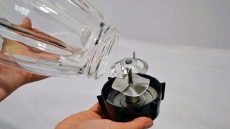CHICAGO — There are no bomb blasts or collisions with burly linemen in Susan Contreras' past. Her headaches, memory loss and bouts of confused thinking were a mystery until doctors suggested a probable cause: domestic violence.
A former partner repeatedly beat her, she says.
"He would hit me mainly in the head so that nobody would see the injuries. He'd hit me in the back of the head so the bruises wouldn't show," the Phoenix woman said.
The abuse from her ex-partner took a heavy emotional toll, Contreras says. But even though he sometimes knocked her out, she hadn't considered that her brain might have been as damaged as her psyche.
"Honestly, there's so many holes in my memory, thinking problems," she said. "My memory is really gone."
Brain trauma in domestic violence survivors has been overshadowed by concerns about injuries in Iraq and Afghanistan war vets, and by effects of repeated head blows in football players. Experts believe many cases go undetected and untreated in abused women, making them vulnerable to problems with thinking, mood and behaviour.
Advocates say the injuries leave some survivors so impaired that they can't manage their jobs and lives. Some even end up homeless.
About one-quarter of U.S. women and 14 per cent of men have experienced severe physical assaults by a partner in their lifetime, including hitting, punching, being slammed against something hard or pushed down stairs, according to the federal Centers for Disease Control and Prevention . Head and neck injuries are among the most common, and data suggest that domestic assaults may cause traumatic brain injuries in at least 60 per cent of survivors, according to a research review published this year in the journal Family & Community Health.
Traumatic brain injuries can result from even a single sudden blow to the head. The symptoms may be short-term or long-lasting, and repeated assaults increase chances for permanent neurological damage. Whether that damage can cause the downward spiral that domestic violence survivors sometimes get caught in is unproven, but studies have found these brain injuries are more common in homeless people than in the general population. And there's no dispute that they can cause life-changing disabilities.
"This population is not unlike that of our athletes," said Dr. Javier Cardenas, director of a brain injury program at Barrow Neurological Institute in Phoenix. He's a trauma consultant for the National Football League and also treats domestic violence survivors.
Cardenas cited Baltimore Ravens' running back Ray Rice's 2014 attack on his then-fiancee, caught on an elevator video camera. Much of the public discussion about the incident was about whether brain injuries in football players may be linked to violent behaviour off the field. It overlooked a far more obvious injury.
"When Janay Rice was knocked out cold in the elevator, attention was all about how Ray Rice had previous concussions. Nobody mentioned that the woman in the elevator suffered a brain injury right in front of everybody's eyes," Cardenas said.
Traumatic brain injuries include concussions and don't always cause loss of consciousness or damage that can be detected on imaging scans. Symptoms may not occur immediately but can develop over time, making it difficult sometimes to link them with previous abuse.
The brain isn't a hard, fixed organ. It's more like jello, surrounded by cerebrospinal fluid that works like a shock absorber when the head is hit. A violent blow — from colliding with a linebacker's helmet, from blast pressure after an explosion, or from a partner's angry fist — can damage brain cells at the point of impact and slam the brain against the skull, sometimes bruising tissue, tearing nerve fibers, or causing bleeding.
Repeated blows have been linked with a degenerative brain disease called chronic traumatic encephalopathy. CTE first made headlines several years ago when it was found in the brains of retired NFL players who had killed themselves. Research linking domestic violence with suicide is sparse, although several small studies have suggested that suicide attempts are much more common among battered women than among those who have not experienced partner abuse.
CTE is linked with memory loss, confusion, mood changes including depression and eventually dementia. Some scientists think domestic violence survivors might be at risk.
"I have no doubt that there are many women who have been abused enough that some of them probably have CTE," said Dr. Robert Cantu, a leading expert on football-related brain injuries and co-director of Boston University's Center for the Study of Traumatic Encephalopathy.
He said medical literature contains just one published case about probable CTE linked with domestic violence — a 1990 Lancet report about an autopsy on an abused 76-year-old British woman who had developed dementia. Her brain showed abnormalities resembling those seen in the brains of "punch-drunk" boxers.
Survivors often don't seek immediate medical attention, or when they do, they often fear disclosing what caused their injuries. Some wait years, when troublesome symptoms persist or emerge, and then, many victims and doctors don't connect the problems with domestic abuse, said researcher Jacquelyn Campbell, a professor at Johns Hopkins School of Nursing.

Many physician groups recommend that doctors screen women for domestic violence in emergency rooms or doctor offices, and the Affordable Care Act says insurance plans should cover the screening with no copays. But when screening occurs, questions often don't address traumatic brain injuries, and symptoms are sometimes thought to be a psychological reaction to abuse, so doctors don't probe further, Campbell said.
Jennifer Kershaw, a Columbus, Ohio-area school teacher who won a court victory last year in an abuse lawsuit against her ex-husband, says she doesn't remember doctors ever mentioning traumatic brain injury after her 2013 beating, despite her symptoms.
"He put me in a headlock and punched me in the face I don't know how many times," she said. "Then he kneed me in the face." She said she went to the emergency room with a black eye, broken cheekbone, nausea and dizziness, and still has difficulty concentrating.
Though it's not clear if she did have a concussion or other brain injury, her symptoms are among those many experts say should lead doctors to investigate further.
"If a woman comes in with a black eye" or is otherwise being assessed for domestic violence, "we need to provide some good neurological workups like the help that is being provided to our veterans with traumatic brain injury," Campbell said.
That includes detailed questions about symptoms, physical and mental exams, and sometimes imaging scans if more severe brain injury is suspected.
Susan Contreras, 47, didn't get that kind of exam until almost 10 years after her final beating, after she landed in a Phoenix homeless shelter. A therapist there was concerned about her symptoms and sent her last December to the Barrow institute. The neurological centre has established an unusual program offering an array of free treatment to homeless domestic violence survivors.
Social worker Ashley Bridwell helped create the program after working with homeless shelters and noticing many women with suspected brain injuries.
Many were hit in the head dozens of times, Bridwell said. "Some were slammed into a wall or down a flight of stairs. These women have lived pretty hard lives," and their brain damage can make it hard to navigate out of homelessness, she said.
Sometimes imaging tests show brain scarring that, in a strange way, can be comforting to survivors.
"They feel a sense of relief knowing there is a physical or medical reason for their problems," Dr. Cardenas said.





